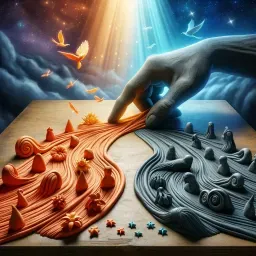”The fool doth think he is wise,
but the wise man knows himself to be a fool“

- Meaning
- This phrase insightfully captures a paradox of human self-awareness and humility. In simpler terms, it suggests that true wisdom comes with the recognition of one's limitations and ignorance. The 'fool' represents someone who, lacking in true insight, overestimates their knowledge or wisdom. In contrast, the 'wise man' is depicted as someone aware of the vast realms of what they do not know, embodying a humble acknowledgment of their own limitations, which ironically makes them wiser.
- Allegory
- In the crafted image, the two central figures symbolize the contrasting states of mind discussed in Shakespeare’s quote. The ostentatious figure under the spotlight reveals how self-deception is often brightly dressed and noticeable, alluring yet ultimately shallow. In contrast, the humble figure under the night sky represents the depth of true wisdom, suggesting that an aware mind finds its place under the enormity of the unknown universe, indicating both humility and the pursuit of deeper understanding.
- Applicability
- In everyday life, this Shakespearean wisdom serves as a reminder of the importance of humility and lifelong learning. It can be applied in personal development, urging individuals to remain open to new learnings and perspectives instead of becoming complacent with their current knowledge. In professional environments, it encourages leaders and team members to value continuous learning and to acknowledge the contributions and insights of others.
- Impact
- The impact of this Shakespearean quote is significant in both literary and everyday contexts. It is frequently cited in discussions about wisdom and humility. Its insight into human psychology and behavior makes it a timeless reflection on the human condition, resonating in educational and philosophical discourse.
- Historical Context
- The phrase comes from "As You LIke It," a play by Shakespeare believed to have been written in 1599 or early 1600. This period is known as the Elizabethan era, characterized by the flowering of English culture under the reign of Queen Elizabeth I. This era was marked by a profound interest in philosophical explorations of human nature, which is evident in the literature of the time, including Shakespeare's works.
- Criticisms
- While there might not be direct criticisms of this particular quote, debates could arise over interpretations of what constitutes true wisdom and how awareness of one's ignorance might be practically embraced without leading to inertia or self-doubt.
- Variations
- Despite the Western origin of Shakespeare's quote, the concept of appreciating one's own limitations and the value of humility is found universally across various cultures. In Eastern philosophies, such as Taoism and Buddhism, recognizing one's limits and continuous learning are seen as important elements of wisdom and living a harmonious life.
-

Alea iacta est
-

Doubt thou the stars are fire; Doubt that the sun doth move; Doubt truth to be a liar; But never doubt I love.
-

We know what we are, but not what we may be.
-

Be not afraid of greatness. Some are born great, some achieve greatness, and others have greatness thrust upon them.
-

The fault, dear Brutus, is not in our stars, but in ourselves.
-

Love looks not with the eyes but with the mind.
-

Hell is empty and all the devils are here.
-

Before me every knee will bow; by me every tongue will swear.
-

There is nothing either good or bad, but thinking makes it so.
-

Love all, trust a few, Do wrong to none: be able for thine enemy Rather in power than use; and keep thy friend Under thy own life's key: be check'd for silence, But never tax'd for speech.
-

It is not in the stars to hold our destiny but in ourselves
-

Better three hours too soon, than a minute too late.
No Comments